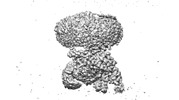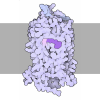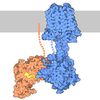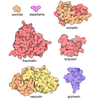+ Open data
Open data
- Basic information
Basic information
| Entry | Database: PDB / ID: 7v9l | ||||||||||||||||||
|---|---|---|---|---|---|---|---|---|---|---|---|---|---|---|---|---|---|---|---|
| Title | Cryo-EM structure of the SV1-Gs complex. | ||||||||||||||||||
 Components Components |
| ||||||||||||||||||
 Keywords Keywords |  STRUCTURAL PROTEIN / STRUCTURAL PROTEIN /  class B GPCR / receptor bias / class B GPCR / receptor bias /  cancer / cancer /  cell proliferation cell proliferation | ||||||||||||||||||
| Function / homology |  Function and homology information Function and homology information growth hormone-releasing hormone receptor activity / G-protein activation / Activation of the phototransduction cascade / : / Glucagon-type ligand receptors / Thromboxane signalling through TP receptor / Sensory perception of sweet, bitter, and umami (glutamate) taste / G beta:gamma signalling through PI3Kgamma / G beta:gamma signalling through CDC42 / Cooperation of PDCL (PhLP1) and TRiC/CCT in G-protein beta folding ... growth hormone-releasing hormone receptor activity / G-protein activation / Activation of the phototransduction cascade / : / Glucagon-type ligand receptors / Thromboxane signalling through TP receptor / Sensory perception of sweet, bitter, and umami (glutamate) taste / G beta:gamma signalling through PI3Kgamma / G beta:gamma signalling through CDC42 / Cooperation of PDCL (PhLP1) and TRiC/CCT in G-protein beta folding ... growth hormone-releasing hormone receptor activity / G-protein activation / Activation of the phototransduction cascade / : / Glucagon-type ligand receptors / Thromboxane signalling through TP receptor / Sensory perception of sweet, bitter, and umami (glutamate) taste / G beta:gamma signalling through PI3Kgamma / G beta:gamma signalling through CDC42 / Cooperation of PDCL (PhLP1) and TRiC/CCT in G-protein beta folding / Ca2+ pathway / Activation of G protein gated Potassium channels / Synthesis, secretion, and inactivation of Glucagon-like Peptide-1 (GLP-1) / Inhibition of voltage gated Ca2+ channels via Gbeta/gamma subunits / G alpha (z) signalling events / Vasopressin regulates renal water homeostasis via Aquaporins / Glucagon-like Peptide-1 (GLP1) regulates insulin secretion / Adrenaline,noradrenaline inhibits insulin secretion / ADP signalling through P2Y purinoceptor 12 / G alpha (q) signalling events / G alpha (i) signalling events / Thrombin signalling through proteinase activated receptors (PARs) / Activation of G protein gated Potassium channels / G-protein activation / G beta:gamma signalling through PI3Kgamma / Prostacyclin signalling through prostacyclin receptor / G beta:gamma signalling through PLC beta / ADP signalling through P2Y purinoceptor 1 / Thromboxane signalling through TP receptor / Presynaptic function of Kainate receptors / G beta:gamma signalling through CDC42 / Inhibition of voltage gated Ca2+ channels via Gbeta/gamma subunits / Glucagon-type ligand receptors / growth hormone-releasing hormone receptor activity / G-protein activation / Activation of the phototransduction cascade / : / Glucagon-type ligand receptors / Thromboxane signalling through TP receptor / Sensory perception of sweet, bitter, and umami (glutamate) taste / G beta:gamma signalling through PI3Kgamma / G beta:gamma signalling through CDC42 / Cooperation of PDCL (PhLP1) and TRiC/CCT in G-protein beta folding / Ca2+ pathway / Activation of G protein gated Potassium channels / Synthesis, secretion, and inactivation of Glucagon-like Peptide-1 (GLP-1) / Inhibition of voltage gated Ca2+ channels via Gbeta/gamma subunits / G alpha (z) signalling events / Vasopressin regulates renal water homeostasis via Aquaporins / Glucagon-like Peptide-1 (GLP1) regulates insulin secretion / Adrenaline,noradrenaline inhibits insulin secretion / ADP signalling through P2Y purinoceptor 12 / G alpha (q) signalling events / G alpha (i) signalling events / Thrombin signalling through proteinase activated receptors (PARs) / Activation of G protein gated Potassium channels / G-protein activation / G beta:gamma signalling through PI3Kgamma / Prostacyclin signalling through prostacyclin receptor / G beta:gamma signalling through PLC beta / ADP signalling through P2Y purinoceptor 1 / Thromboxane signalling through TP receptor / Presynaptic function of Kainate receptors / G beta:gamma signalling through CDC42 / Inhibition of voltage gated Ca2+ channels via Gbeta/gamma subunits / Glucagon-type ligand receptors /  alkylglycerophosphoethanolamine phosphodiesterase activity / Adrenaline,noradrenaline inhibits insulin secretion / G alpha (12/13) signalling events / G beta:gamma signalling through BTK / ADP signalling through P2Y purinoceptor 12 / Cooperation of PDCL (PhLP1) and TRiC/CCT in G-protein beta folding / Thrombin signalling through proteinase activated receptors (PARs) / Ca2+ pathway / G alpha (z) signalling events / Extra-nuclear estrogen signaling / G alpha (s) signalling events / G alpha (q) signalling events / photoreceptor outer segment membrane / G alpha (i) signalling events / Glucagon-like Peptide-1 (GLP1) regulates insulin secretion / alkylglycerophosphoethanolamine phosphodiesterase activity / Adrenaline,noradrenaline inhibits insulin secretion / G alpha (12/13) signalling events / G beta:gamma signalling through BTK / ADP signalling through P2Y purinoceptor 12 / Cooperation of PDCL (PhLP1) and TRiC/CCT in G-protein beta folding / Thrombin signalling through proteinase activated receptors (PARs) / Ca2+ pathway / G alpha (z) signalling events / Extra-nuclear estrogen signaling / G alpha (s) signalling events / G alpha (q) signalling events / photoreceptor outer segment membrane / G alpha (i) signalling events / Glucagon-like Peptide-1 (GLP1) regulates insulin secretion /  spectrin binding / Vasopressin regulates renal water homeostasis via Aquaporins / photoreceptor outer segment / cardiac muscle cell apoptotic process / photoreceptor inner segment / cellular response to catecholamine stimulus / adenylate cyclase-activating dopamine receptor signaling pathway / cellular response to prostaglandin E stimulus / sensory perception of taste / G-protein beta-subunit binding / spectrin binding / Vasopressin regulates renal water homeostasis via Aquaporins / photoreceptor outer segment / cardiac muscle cell apoptotic process / photoreceptor inner segment / cellular response to catecholamine stimulus / adenylate cyclase-activating dopamine receptor signaling pathway / cellular response to prostaglandin E stimulus / sensory perception of taste / G-protein beta-subunit binding /  heterotrimeric G-protein complex / signaling receptor complex adaptor activity / retina development in camera-type eye / heterotrimeric G-protein complex / signaling receptor complex adaptor activity / retina development in camera-type eye /  GTPase binding / GTPase binding /  cell body / phospholipase C-activating G protein-coupled receptor signaling pathway / positive regulation of cytosolic calcium ion concentration / cellular response to hypoxia / cell population proliferation / membrane => GO:0016020 / cell surface receptor signaling pathway / G protein-coupled receptor signaling pathway / cell body / phospholipase C-activating G protein-coupled receptor signaling pathway / positive regulation of cytosolic calcium ion concentration / cellular response to hypoxia / cell population proliferation / membrane => GO:0016020 / cell surface receptor signaling pathway / G protein-coupled receptor signaling pathway /  GTPase activity / GTPase activity /  dendrite / protein-containing complex binding / dendrite / protein-containing complex binding /  membrane / membrane /  plasma membrane / plasma membrane /  cytoplasm cytoplasmSimilarity search - Function | ||||||||||||||||||
| Biological species |   Homo sapiens (human) Homo sapiens (human)  Bos taurus (cattle) Bos taurus (cattle)synthetic construct (others)   Rattus norvegicus (Norway rat) Rattus norvegicus (Norway rat) | ||||||||||||||||||
| Method |  ELECTRON MICROSCOPY / ELECTRON MICROSCOPY /  single particle reconstruction / single particle reconstruction /  cryo EM / Resolution: 2.6 Å cryo EM / Resolution: 2.6 Å | ||||||||||||||||||
 Authors Authors | Cong, Z.T. / Zhou, F.L. / Zhang, C. / Zou, X.Y. / Zhang, H.B. / Wang, Y.Z. / Zhou, Q.T. / Cai, X.Q. / Liu, Q.F. / Li, J. ...Cong, Z.T. / Zhou, F.L. / Zhang, C. / Zou, X.Y. / Zhang, H.B. / Wang, Y.Z. / Zhou, Q.T. / Cai, X.Q. / Liu, Q.F. / Li, J. / Shao, L.J. / Mao, C.Y. / Wang, X. / Wu, J.H. / Xia, T. / Zhao, L.H. / Jiang, H.L. / Zhang, Y. / Xu, H.E. / Cheng, X. / Yang, D.H. / Wang, M.W. | ||||||||||||||||||
| Funding support |  China, 5items China, 5items
| ||||||||||||||||||
 Citation Citation |  Journal: Proc Natl Acad Sci U S A / Year: 2021 Journal: Proc Natl Acad Sci U S A / Year: 2021Title: Constitutive signal bias mediated by the human GHRHR splice variant 1. Authors: Zhaotong Cong / Fulai Zhou / Chao Zhang / Xinyu Zou / Huibing Zhang / Yuzhe Wang / Qingtong Zhou / Xiaoqing Cai / Qiaofeng Liu / Jie Li / Lijun Shao / Chunyou Mao / Xi Wang / Jihong Wu / ...Authors: Zhaotong Cong / Fulai Zhou / Chao Zhang / Xinyu Zou / Huibing Zhang / Yuzhe Wang / Qingtong Zhou / Xiaoqing Cai / Qiaofeng Liu / Jie Li / Lijun Shao / Chunyou Mao / Xi Wang / Jihong Wu / Tian Xia / Li-Hua Zhao / Hualiang Jiang / Yan Zhang / H Eric Xu / Xi Cheng / Dehua Yang / Ming-Wei Wang /  Abstract: Alternative splicing of G protein-coupled receptors has been observed, but their functions are largely unknown. Here, we report that a splice variant (SV1) of the human growth hormone-releasing ...Alternative splicing of G protein-coupled receptors has been observed, but their functions are largely unknown. Here, we report that a splice variant (SV1) of the human growth hormone-releasing hormone receptor (GHRHR) is capable of transducing biased signal. Differing only at the receptor N terminus, GHRHR predominantly activates G while SV1 selectively couples to β-arrestins. Based on the cryogenic electron microscopy structures of SV1 in the state or GHRH-bound state in complex with the G protein, molecular dynamics simulations reveal that the N termini of GHRHR and SV1 differentiate the downstream signaling pathways, G versus β-arrestins. As suggested by mutagenesis and functional studies, it appears that GHRH-elicited signal bias toward β-arrestin recruitment is constitutively mediated by SV1. The level of SV1 expression in prostate cancer cells is also positively correlated with ERK1/2 phosphorylation but negatively correlated with cAMP response. Our findings imply that constitutive signal bias may be a mechanism that ensures cancer cell proliferation. | ||||||||||||||||||
| History |
|
- Structure visualization
Structure visualization
| Structure viewer | Molecule:  Molmil Molmil Jmol/JSmol Jmol/JSmol |
|---|
- Downloads & links
Downloads & links
- Download
Download
| PDBx/mmCIF format |  7v9l.cif.gz 7v9l.cif.gz | 195.1 KB | Display |  PDBx/mmCIF format PDBx/mmCIF format |
|---|---|---|---|---|
| PDB format |  pdb7v9l.ent.gz pdb7v9l.ent.gz | 152.7 KB | Display |  PDB format PDB format |
| PDBx/mmJSON format |  7v9l.json.gz 7v9l.json.gz | Tree view |  PDBx/mmJSON format PDBx/mmJSON format | |
| Others |  Other downloads Other downloads |
-Validation report
| Arichive directory |  https://data.pdbj.org/pub/pdb/validation_reports/v9/7v9l https://data.pdbj.org/pub/pdb/validation_reports/v9/7v9l ftp://data.pdbj.org/pub/pdb/validation_reports/v9/7v9l ftp://data.pdbj.org/pub/pdb/validation_reports/v9/7v9l | HTTPS FTP |
|---|
-Related structure data
| Related structure data |  31824MC  7v9mC M: map data used to model this data C: citing same article ( |
|---|---|
| Similar structure data | Similarity search - Function & homology  F&H Search F&H Search |
- Links
Links
- Assembly
Assembly
| Deposited unit | 
|
|---|---|
| 1 |
|
- Components
Components
| #1: Protein | Mass: 41765.363 Da / Num. of mol.: 1 Source method: isolated from a genetically manipulated source Source: (gene. exp.)   Homo sapiens (human) / Production host: Homo sapiens (human) / Production host:   Spodoptera frugiperda (fall armyworm) Spodoptera frugiperda (fall armyworm) |
|---|---|
| #2: Protein | Mass: 57750.316 Da / Num. of mol.: 1 Source method: isolated from a genetically manipulated source Source: (gene. exp.)   Homo sapiens (human) / Gene: GHRHR, hCG_37325 / Production host: Homo sapiens (human) / Gene: GHRHR, hCG_37325 / Production host:   Spodoptera frugiperda (fall armyworm) / References: UniProt: Q9HB45 Spodoptera frugiperda (fall armyworm) / References: UniProt: Q9HB45 |
| #3: Protein | Mass: 7861.143 Da / Num. of mol.: 1 Source method: isolated from a genetically manipulated source Source: (gene. exp.)   Bos taurus (cattle) / Gene: GNG2 / Production host: Bos taurus (cattle) / Gene: GNG2 / Production host:   Spodoptera frugiperda (fall armyworm) / References: UniProt: P63212 Spodoptera frugiperda (fall armyworm) / References: UniProt: P63212 |
| #4: Antibody |  Single-domain antibody Single-domain antibodyMass: 15343.019 Da / Num. of mol.: 1 Source method: isolated from a genetically manipulated source Source: (gene. exp.) synthetic construct (others) / Production host:   Escherichia coli (E. coli) Escherichia coli (E. coli) |
| #5: Protein | Mass: 40226.992 Da / Num. of mol.: 1 Source method: isolated from a genetically manipulated source Source: (gene. exp.)   Rattus norvegicus (Norway rat) / Gene: Gnb1 / Production host: Rattus norvegicus (Norway rat) / Gene: Gnb1 / Production host:   Spodoptera frugiperda (fall armyworm) / References: UniProt: P54311 Spodoptera frugiperda (fall armyworm) / References: UniProt: P54311 |
-Experimental details
-Experiment
| Experiment | Method:  ELECTRON MICROSCOPY ELECTRON MICROSCOPY |
|---|---|
| EM experiment | Aggregation state: PARTICLE / 3D reconstruction method:  single particle reconstruction single particle reconstruction |
- Sample preparation
Sample preparation
| Component | Name: Cryo-EM structure of the human growth hormone releasing hormone receptor splice variant 1 in complex with G protein Type: COMPLEX / Entity ID: all / Source: RECOMBINANT |
|---|---|
| Source (natural) | Organism:   Homo sapiens (human) Homo sapiens (human) |
| Source (recombinant) | Organism:   Spodoptera frugiperda (fall armyworm) Spodoptera frugiperda (fall armyworm) |
| Buffer solution | pH: 7.4 |
| Specimen | Embedding applied: NO / Shadowing applied: NO / Staining applied : NO / Vitrification applied : NO / Vitrification applied : YES : YES |
Vitrification | Cryogen name: ETHANE |
- Electron microscopy imaging
Electron microscopy imaging
| Experimental equipment |  Model: Titan Krios / Image courtesy: FEI Company |
|---|---|
| Microscopy | Model: FEI TITAN KRIOS |
| Electron gun | Electron source : OTHER / Accelerating voltage: 300 kV / Illumination mode: OTHER : OTHER / Accelerating voltage: 300 kV / Illumination mode: OTHER |
| Electron lens | Mode: BRIGHT FIELD Bright-field microscopy Bright-field microscopy |
| Image recording | Electron dose: 80 e/Å2 / Film or detector model: GATAN K3 (6k x 4k) |
- Processing
Processing
| Software | Name: PHENIX / Version: 1.18.2_3874: / Classification: refinement | ||||||||||||||||||||||||
|---|---|---|---|---|---|---|---|---|---|---|---|---|---|---|---|---|---|---|---|---|---|---|---|---|---|
CTF correction | Type: PHASE FLIPPING AND AMPLITUDE CORRECTION | ||||||||||||||||||||||||
3D reconstruction | Resolution: 2.6 Å / Resolution method: DIFFRACTION PATTERN/LAYERLINES / Num. of particles: 377241 / Symmetry type: POINT | ||||||||||||||||||||||||
| Refine LS restraints |
|
 Movie
Movie Controller
Controller




 PDBj
PDBj














